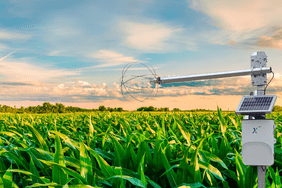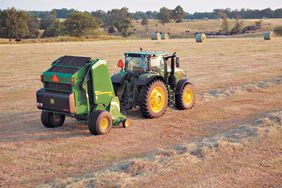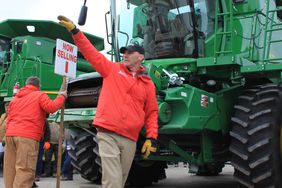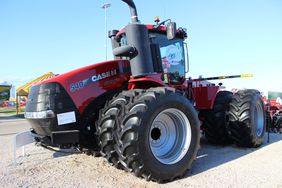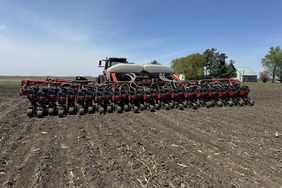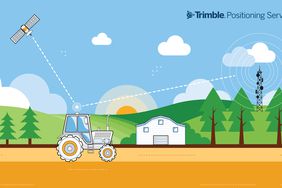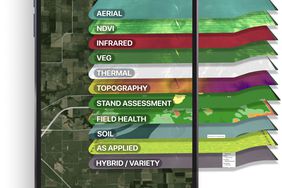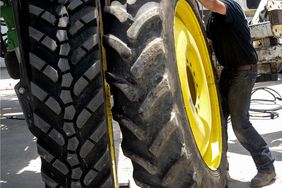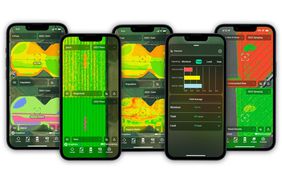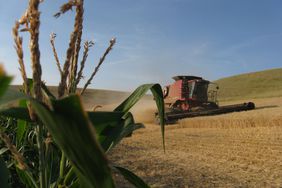:max_bytes(150000):strip_icc()/iStock-625269414-2000-c58613f97293473e8e20514cc3283ae3.jpg)
Data collection and artificial intelligence (AI) implementation have become increasingly prevalent among new agriculture technology — but not everyone is ready to adopt it to their operations. Panelists at the 2023 World Agri-Tech Summit in San Francisco talked about the impact of new technologies, and how to accelerate its use on farms.
Artificial intelligence on the farm
One of the most powerful functions of AI is its ability to identify stressors on a crop, and produce data to mitigate that stress, according to Mark Dann, the industry manager at Esri, a geographic information system company.
"Once you introduce stress to a crop, there's nothing you can do to recover that yield potential," says Dann. "All you can do is maximize what your response to that next level of stress is."
Randy Barker, the CEO and co-founder of Intent Ag, a technology and insights company, says data management needs to be more efficient, convenient, and sustainable to turn it into a valuable tool for farmers.
"Farmers create data, and I think it's the industry or the supply chain of ag that can monetize the data through that life cycle of creating better products," says Barker. "I think you want to monetize something where both parties are winning simultaneously, and then we get better products faster that actually work on the farm."
Mixing data
The number of data solutions, and in turn, the number of data points per acre on a farm, have increased exponentially in recent years. One of the major challenges facing the agricultural industry is connecting those data points into a meaningful, specific prescription for farmers, according to Ron Baruchi, CEO of Agmatix, an agro informatics company.
"Because everyone is creating digital modeling tools, this creates a lot of siloed data," says Baruchi. "If we were able to find the right standardization level between data sets and create clear standards between the different solutions, we will see more data collaborations. I think open data is the future."
Dann says a democratized, geospatial data hub is key to bringing the data together.
Strong privacy policies, with the ability to delist, or privatize, their data may give farmers the trust they need to be willing to share data, according to Barker. Even still, in his experience, it hasn't been too difficult.
"We have farmers who we do trials with offering to send more data for processing," says Barker. "They're like, 'Can you share more? Can I provide context?' They're more than willing to share because they see the synergy, or the value of context. What they don't want to be is trespassed or abused."
Dann says he sees younger generations of farmers more willing to share the data, as they are more accustomed to the integration of technology in their lives, but it still comes down to trust and the promise of actionable data with a potential ROI.
Macro to micromanagement
The resolution, or scale, of data, has been getting higher, slowly narrowing down from entire farms to acres, and soon down to the individual plant.
"We were at satellite level, down to equipment precision planting — GPS is down to computer vision, with extraordinarily high resolution," says Barker. "We're at this wonderful moment where we really could manage at the plant, or sub-plant level. Biological science is there, and now engineering is getting to that level."
Barker hopes with AI technology processing data and computer vision, farmers will be able to manage their fields, down to individual sections of the plant, in real time.
"One of the challenges standing in the way is finding the right technology to reach that scale at the right price," says Baruchi. "The value is clear, but the amount of work needed to get there is complicated. "
The World Agri-Tech Innovation Summit takes place each year in London and San Francisco. For more information about the event, visit WorldAgriTechUSA.com.
:max_bytes(150000):strip_icc()/_D3_6951-2b36bbe5727444fb9b3b968da4e62f78.jpg)
